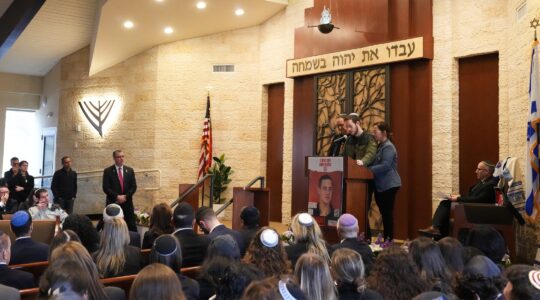The announcement of Pope Benedict XVI’s resignation came as a surprise the world over. Below is a look back at highlights of his eight-year papacy, which included more than a few noteworthy clashes with the Jewish community.
1987 — Catholic-Jewish relations shaken by a comment published in an Italian magazine that Judaism “finds its fulfillment” in “the reality of Jesus Christ.” The comment was made by Cardinal Joseph Ratzinger, papal adviser and head of the Vatican Congregation for the Doctrine of the Faith. By January 1988, Ratzinger had changed his tune, stating that Catholics should “respect the point of view of our Jewish brothers” who do not see the New Testament “as a fulfillment.”
1992 — Ratzinger visits Israel and meets with Jerusalem mayor Teddy Kollek. The Vatican does not have formal diplomatic relations with Israel beyond de facto recognition.
1994 — International Jewish-Christian Conference on Modern Social and Scientific Challenges draws more than 500 delegates from nearly 100 countries. Cardinal Joseph Ratzinger is dubbed “the world’s most powerful cardinal.”
2000 — German magazine Focus reports that a book by Ratzinger says “Catholics don’t want to impose Christ on the Jews, but they are waiting for the moment when Israel too says yes to Christ.”
2002 — According to Rabbi Arthur Schneier, a new document by the Vatican represents a turning point in how Roman Catholic doctrine relates to the Hebrew Bible. According to the document released in December 2001, Jews and Christians alike await the Messiah but Jews are waiting for the first coming, and Christians for the second. Ratzinger, the Vatican’s chief theologian and a signatory to the document, explains, “The difference consists in the fact that for us, he who will come will have the same traits of that Jesus who has already come.”
2005 — Cardinal Ratzinger is elected to the papacy on Apr. 19. Jewish organizational leaders around the world welcome the new pope, hoping that he’ll continue Pope John Paul II’s legacy of fostering positive relations with Jews. In one of his first official acts, he writes to Rome Chief Rabbi Riccardo Di Segni and other Jewish leaders, pledging to further Jewish-Catholic relations. The German Jewish community raises concerns that Ratzinger, who adopts the name Benedict XVI, isn’t familiar with Jewish issues and may not be interested in promoting them. Ratzinger’s reported participation in the Hitler Youth movement makes some Jews wince, though JTA notes that he defected from the German army during WWII. World Jewish Congress chairman Rabbi Israel Singer hails the new Pope as “the architect of the policy that John Paul II fulfilled with regard to relations with the Jews. He is the architect of the ideological policy to recognize, to have full relations with Israel.”
16-year-old Israeli Liel Kolet sings for Pope Benedict XVI at a youth conference in Germany.
2007: In a controversial decision, Pope Benedict XVI expands the use of Latin Mass, an older form of Catholic worship that includes a prayer read only on Good Friday for the conversion of the Jews. The Pope’s intention is to promote greater unity within the church, though some in the Jewish community oppose the move.
2008 — With the Latin Mass controversy still brewing, Pope Benedict XVI offers Passover greetings to Jews in New York during his first visit to an American synagogue. 50 years after the death of WWII-era Pope Pius XII, who critics accuse of turning a blind eye to Jewish suffering during the Holocaust, Benedict XVI still favors him for beatification.
2009 — A “crisis” in Catholic-Jewish relations is reportedly triggered by Pope Benedict XVI’s decision to rescind the 1988 excommunication of British-born bishop Richard Williamson and to reinstate two other Holocaust deniers. German Jewish leaders call the move a “slap in the face for the Jewish community.” The Pope’s decision comes two weeks after Italian rabbis announce their intention to boycott the Italian Catholic Church’s annual “Day of Judaism” celebration, citing opposition to the pope’s policies. Williamson doesn’t recant his Holocaust-denying statements, instead apologizing for the “imprudence” of his remarks. In Argentina, Williamson is ousted from his position as head of a seminary. In March, the pope admits to having botched the move while the Vatican’s envoy to Israel states that a Catholic may not deny the Holocaust.
Pope Benedict has an eventful visit to Israel, vowing to fight anti-Semitism, placing a note in the Kotel and halting an interfaith conference when a Palestinian cleric accuses Israel of killing women and children. Prior to the trip, Israel asks him to leave the Popemobile at home.
JTA has documented Jewish history in real-time for over a century. Keep our journalism strong by joining us in supporting independent, award-winning reporting.





